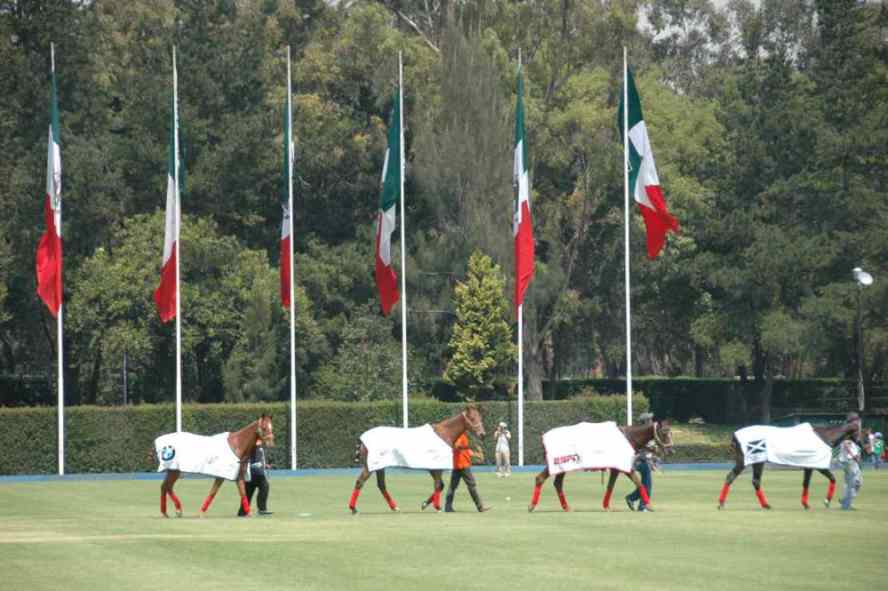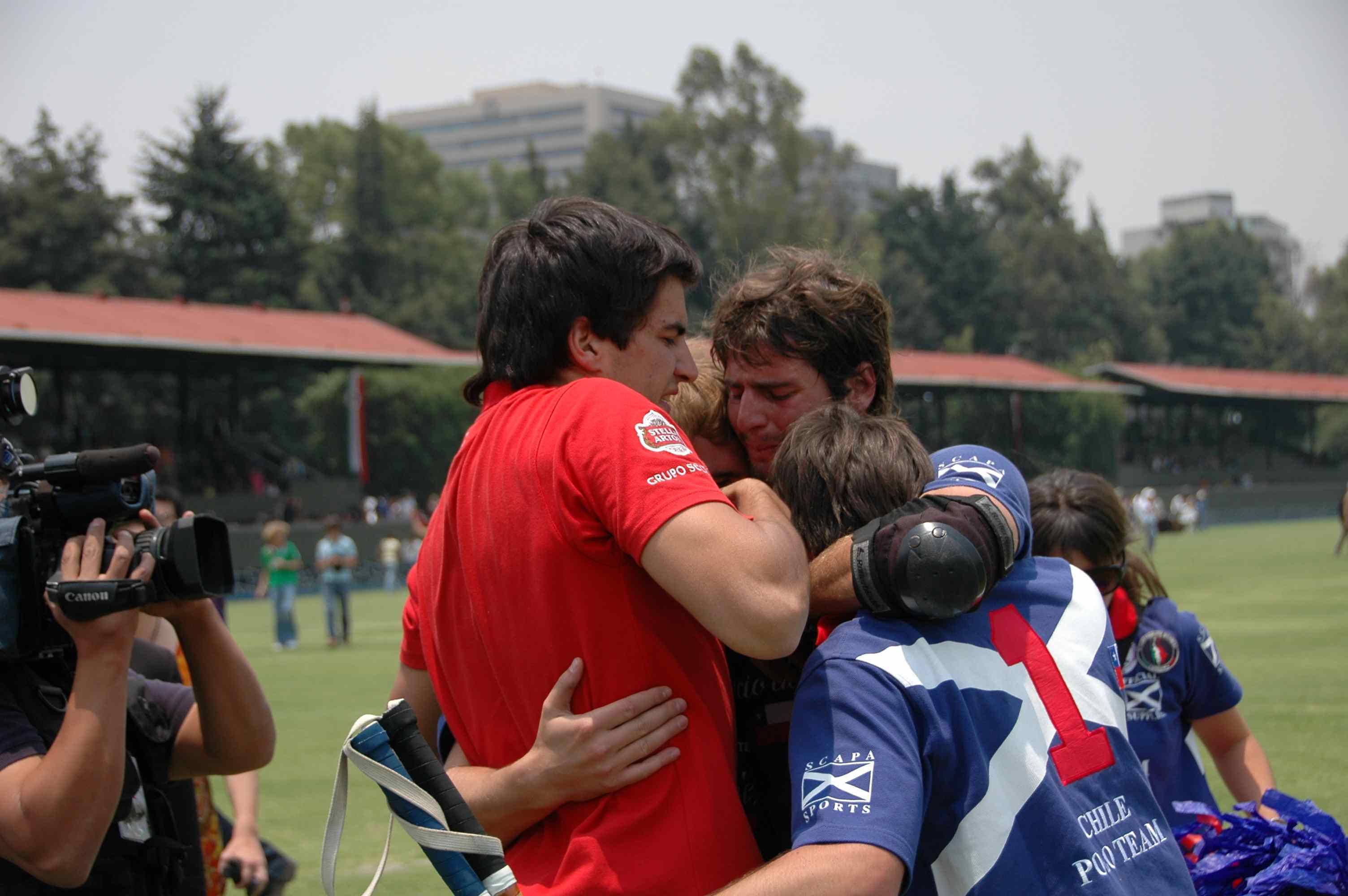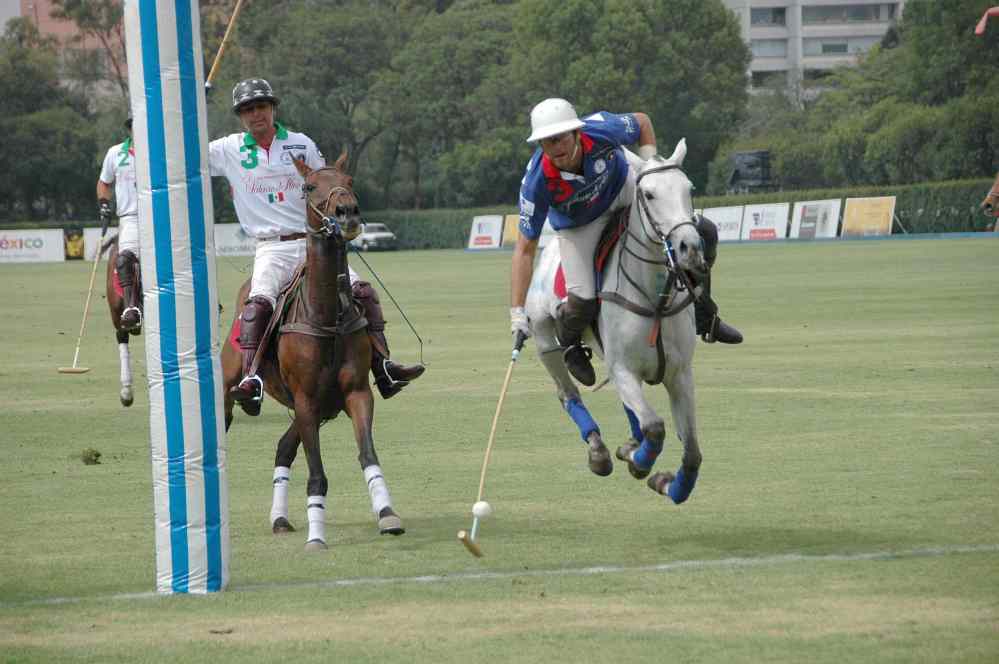

Elegance and excitement, envy and exasperation--all were seen and felt in abundance at the eighth triennial tournament of the Federation of International Polo on Mexico City's shrine to the god of war, Campo Marte.
Last recognized as an Olympic sport in the 1930s, international polo has since had to cope with a demotion in status. But as a recognized federation by the International Olympic Committee, the FIP and its World Cup, played more or less every three years, has become the world-class act of amateur competition in the sport. Since its premier event in Argentina in 1987 the International Polo Federation has successfully produced its world championship polo events in Berlin, Santiago, Saint Moritz, Santa Barbara, Melbourne, Chantilly--and now Mexico
But if it sounds easy, it was not. Organizing a polo event of this size and scale was a gargantuan and daunting task as Mexican Polo Federation President Rogelio Igartua and tournament organizer Guillermo Steta well knew it would be. And it became even more so after two of Mexico's most exalted poloists and promoters of the event departed this world before seeing the harvest of their efforts--Pablo Rincon Gallardo and Patricio Mujica--leaving their surviving comrades to soldier on and try to bring it all to a successful conclusion.
Aside from the many other logistical problems such an undertaking entails, the single greatest one was arguably coming up with 240 suitable horses--30 per team--to say nothing of devising a system to distribute them equitably among the contestants, many of whom are by nature suspicious of this all-important aspect of competitive polo on borrowed mounts.
The horses were provided by various Mexican players and sponsors, including Giorgio Brignone of Costa Careyes Polo Club on the Pacific Coast south of Puerto Vallarta. Brignone, along with Costa Careyes regulars Alberto Ardissone, Bolko Kissling, and Jimmy Giebeler, provided more than 40 horses for the event, 38 of which made it to the final, showing their fitness in adapting from their native seacoast terrain to the rarified air of the high Valley of Mexico. Tecamac Polo Club members also generously contributed mounts, as did Queretaro's el Marques Polo Club, players from Guadalajara, Monterrey, and others.
The Mexican FIP polo fiesta ran from April 21 to May 3, with eight 14-goal teams from Brazil, New Zealand, South Africa, England, Spain, Mexico, Canada and Chile vying for the prestigious international title. No individual player was ranked higher than 5 goals. Brazil was the reigning champion with victories in the last two Polo World Championships, and all of the other teams had the Brazilian team in their sights.
On the evening of April 21 the FIP hosted an inaugural reception at the Hotel Nikko, one of a cluster of high-rise hotels that tower over the Campo Marte field between Mexico City’s posh Polanco district and sprawling Chapultepec Park. The event was attended by players, coaches, sponsors, supporters and journalists. Tournament director Farouk S. Younes welcomed players and guests and encouraged fair play and sportsmanship from all teams. Each team was then presented official game jerseys in its national colors.
In a tense atmosphere reminiscent of a high-stakes poker game, the tournament’s horse draw also took place at the Hotel Nikko (which housed the official tournament headquarters), and teams were mounted on their strings for their first practice game on April 22.
The first tournament game took place April 24 at nearby Tecamac Polo Club with Team Canada facing off against New Zealand (unsuccessfully, as it turned out), the latter country making its first appearance at the World Cup Championship after beating out Australia, India and Pakistan to qualify. Other games included Mexico vs. South Africa, Spain vs. Chile, and England vs. Brazil.
Excitement began to build among the gathering faithful by the weekend of April 26, which saw a number of exciting matches and events. On Saturday the official opening ceremonies were held at Campo Marte, the historic, military polo ground in the heart of Mexico City where the final games would be played. Each of the eight participating countries was represented at the ceremonies while host nation Mexico presented an impressive and entertaining display for the thousands of enthusiastic polo supporters in attendance. Above it all an enormous Mexican flag waved majestically from a flagpole 100 meters tall.
The Campo Marte venue is one of only three in the entire world that occupies a central location in a world-class city (the others being Palermo in Buenos Aires and Chantilly in Paris) and is certainly the equal of either in terms of esthetic appeal and dramatic setting. Campo Marte was the first choice of the organizers from the beginning, but it was by no means certain that they would have it. There was the critical matter of the Mexican election in 2006, for one thing, by which time planning for the event was well underway.
It was generally understood that only candidate Felipe Calderón would consider making the army field available for the polo championship event. Calderón was declared the victor over his popular challenger, Manuel López Obrador, in a disputed election result that threatened to destabilize the entire country—and with only a couple of months to spare, the use of Campo Marte was finally approved.
The feature game on Saturday afternoon at Campo Marte was Mexico vs. England. Mexico came into the game with a tournament record of 1-0 and England at 0- 1, making it a pivotal game in the host nation’s bracket of the tournament. The game was tied 5-5 after the third chukker.
England came on strong in the fourth to take an 8-5 lead going into the last. But to the Englishmen’s dismay a number of fouls were awarded to Mexico, which they converted to tie the game at 8-8 with less than a minute remaining. Mexico then won the final throw-in and took the ball to goal, making the final score 9-8 for Mexico.
On April 29, Team Canada played its final game of the tournament against Spain, losing the contest 10-7, with Spain securing its position in the semifinals. To celebrate the Polo World Cup (and coincidentally console their team’s elimination from the competition, having failed, like England, to win any games), Canadian ambassador to Mexico Guillermo E. Rishchynski, and his wife, Jeannette Portillo Tinoco, had a reception at their official residence on April 30. All teams and their countries’ ambassadors were invited—and most showed up for what proved to be the most successful social mixer of the tournament.
The games continued the following day with semifinals featuring Brazil vs. Spain followed by Chile vs. Mexico. In the first of these Brazil confirmed its reputation as champion and favorite of the World Polo Championship, defeating Spain 7-5, thanks largely to a stellar performance by Caio Siquini, who made four goals. In that game, the South Americans were facing a grimlooking 0-4 scoreboard at the end of the third chukker. But, waking like a sleeping giant, they responded with six unanswered goals, taking total command of the game until the end. Brazil thus advanced to its fifth FIP final in pursuit of its third championship win—but were far from overconfident about their prospects.
“It’s no slam dunk,” said Siquini. “We had the good luck to make it to the final once again, but anything can happen, and we have to maintain the same level of play in order to win.”
In the other semifinal game Chile engaged Mexico in a rough and tumble toand- fro contest that lasted until the bitter end for Mexico in a 10-9 loss. The hardfought battle saw several falls and minor injuries as well as some controversial calls by umpires Steve Lane of the USA and Nicolás Scortichini of Argentina. The Mexican team included two young players of the famous Gracida clan, Carlitos, son of legendary 10- goaler Carlos—and at 17 the youngest player in the tournament; and cousin Julio, 24, son of superstar 10-goaler Memo; Ulysses Escapite; and the ever-phlegmatic, veteran, master poloist Valerio Aguilar as captain.
The Mexicans stayed abreast of the explosive Chilean team but in the end the failure of completed plays cost them the victory. As in the earlier playoff against New Zealand, when Chilean Matias Vial was the nightmare of the Kiwis, his brother Alejandro did the same to the Mexicans and practically eliminated his hosts singlehandedly by converting six penalty shots of Chile’s 10 goals.
We lost some opportunities and he who forgives loses,” said Aguilar, the popular hometown hero who scored five Mexican goals. “They have a lot of experience, they stayed calm when we pressed them hard, and ended up taking it from us.”
These results left Brazil and Chile to face off for the championship game on Saturday, and Mexico and Spain to slug it out for the remaining spot on the podium for the honor of third place.
For the grand finale on Saturday polo fans showed up at Campo Marte in large numbers and high style—and they were not disappointed in the two games they witnessed under sunny tropical skies.
The championship final between Brazil and Chile was played first. Throughout the first five chukkers the Brazilians maintained their lead, although unable to increase it by more than two goals. Chile battled back to tie the score going into the final chukker, then managed to turn the tables as Matías Vial scored on three consecutive opportunities, driving the Andean team to an 11-9, eleventh-hour victory, taking the coveted international trophy from Brazil. A large contingent of Chilean supporters, whose spirited cheering was evident throughout the game, rushed onto the field in celebration.
“We were all so excited, but we managed to stay focused and play as a team and finally prevailed,” said Alejandro Vial, brother of Matías and son of the team’s coach, Alejandro Vial Sr. All were some time in regaining the faculty of speech in the emotional turmoil following the game, which also saw the dejected Brazilians gracefully congratulate the victors.
Because of the condition of the field, which was a bit soft, players of both teams had problems converting penalty shots, Brazil missing two and Chile four.
Next came the final game of the day for the one remaining place on the podium— which engaged the enthusiasm of the hometown crowd every bit as much as the championship final. With the thundering cry of, ¡Sí, se puede! ¡Sí, se puede! ringing from the stands, the Mexican team, consisting of three youngsters led by hardened veteran Aguilar, came from a four-goal disadvantage to shock and destroy the hopes of Spain with a 13-12 win, a dramatic turnaround achieved with only seconds to spare.
Aguilar scored nine of the 13 goals— including the last four—when all seemed lost. This is a feat he has performed more than once in his long career—most recently in the game against England only days earlier. “When we were down so low we just made up our minds to keep going after the win—it was just essential that we do it—and thanks to our final push, we did,” said the emotional captain of the Mexican team. “Incredible that we were beaten on Thursday [by Brazil] as we were, but luckily today we took it, we seized the win. That’s sports!” said Aguilar.
Without dispute “Vale” Aguilar was the man of the hour for Mexico.
The other Aztec scores were attributed to Julio Gracida for three, and Ulysses Escapite for one. For the Spanish motherland, meanwhile, Gonzaga Valdez scored six times, Pascual Sainz made a hat trick, and Ignacio Domecq and Nicolas Alvarez each contributed two. Spain took its loss hard, and once again the maternal lineages of umpires Lane and Scortichini were brought forth for critical review.
“Just another day at the office,” quipped Lane, a highly respected U.S. umpire who had been parachuted in to quell any grumbling about possible bias.
Although fouls were rife in both final games (as they were throughout the entire tournament) this did not seem to diminish their capacity to thrill and excite the spectators. Aside from this, Mexican coach Roberto Gonzalez Gracida reflected that the one thing he could not reproach his team on was the grand spirit it showed in its five games. “We played with all our hearts, with great tenacity, and with our desire to win we were able to do so—besides playing intelligently, as we did, I believe. Spain played a great game, too, and so our third place is well-deserved.
Gracida indicated that he would soon present his report to the Mexican Polo Federation to review his team selection and his possible continued leadership of it. Team selection had generated considerable controversy and debate, mainly because of the youth and inexperience of its younger members.
Throughout the entire event, Argentina, which had curiously chosen not to participate this year, was the elephant in the room, and many conversations were heard speculating about the possible reasons for the team’s absence. But the Mexicans, even in the face of a mountain of organizational difficulties and obstacles that extended deep into the very complex social and political heart of their nation, demonstrated with this success that theirs, too, is a major poloplaying country, blessed with top young players, superbly bred and trained horses, and a venue equal to any in the world.

...and the ecstasy.

Back to Victoria Polo Club Page
